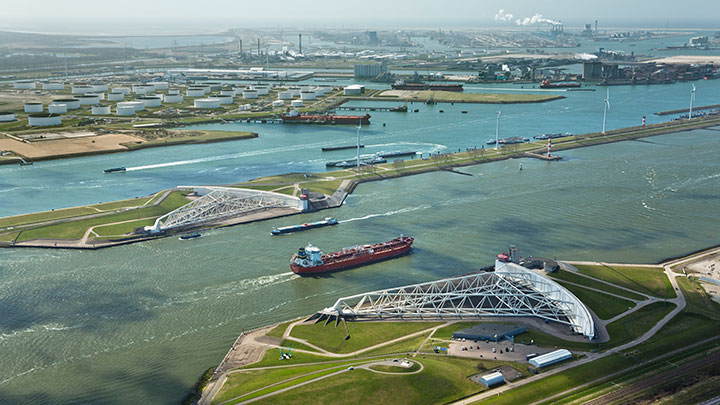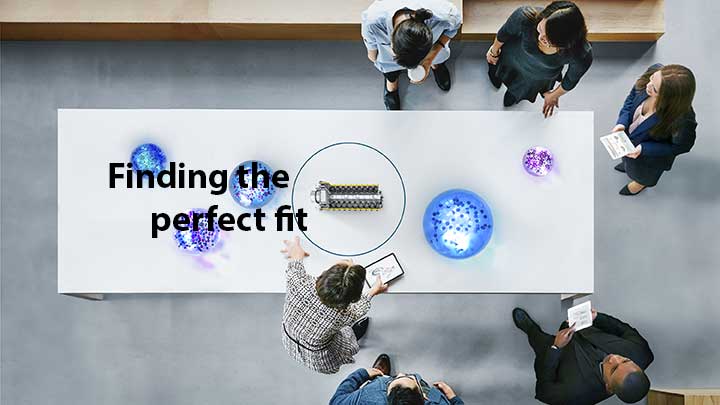Powering sustainable shipping
The global shipping industry is working towards a sustainable future. This means that you will face important choices about the technologies and investments you need in order to stay competitive and at the forefront of compliance for decades to come.
At MAN Energy Solutions, we are helping to shape the sustainability agenda and provide a clear path for you to achieve your goals. As the industry’s trusted partner for class-leading marine systems, we have the expertise and solutions ready
now to support whatever decisions you make.
Introduction to future fuels
Reduction of greenhouse gas emissions in maritime shipping to meet the 2050 targets requires all parties involved and stakeholders to take action.
No matter what vessel you operate, our proven, fuel-flexible engines and propulsion systems enable you to safeguard your future fuel strategy and allow you to take advantage of favorable market conditions. We can also support you with a complete portfolio of retrofit solutions, upgrades, and services, designed to optimize returns from your existing investments.

Future fuels survey 2022 - results
At the end of 2022 we asked our four-stroke customers to participate in our short survey about Future fuels in the maritime shipping industry. Out of all replies, we have extracted and summarized the most relevant results and are happy to share them now with you.
When do you expect the following fuels and engine attributes to be relevant in your application?
In the short and mid term, biofuels and methanol are expected to take the lead and be most relevant for four-stroke applications in the upcoming years, in parallel to a continuously relevant share of LNG driven vessels.
Mid to long term, additional fuels, such as NH3 ready or even H2 may gain relevance.
Future fuels for the maritime industry – Download our new white papers
The shipping industry must halve its GHG emissions by 2050. There are many future fuels to choose from. But which one is right for you?
Learn more about future fuels for the marine industry in our white papers.
Read more about the different future fuel types and discover our extensive portfolio of products, solutions, and services.
Get in touch with our experts
Would you like to learn more about future fuels and which technologies, solutions, and products best meet your needs?
Our global network of dedicated engineers is happy to point out the perfect-fit solution for you and your business. Start your engines now and reach out to us today.

Explore your fuel options
We can now offer multiple options for full fuel flexibility, engine-integrated emission reduction technologies and digital & data-supported operation.
Check out our configurator for two- and four-stroke engines, and find out more.
Related news
BW LPG Takes Up Further Option for LPG-Retrofits
Oslo-listed BW LPG – the world's leading owner and operator of LPG vessels – has announced today that it will retrofit a further three MAN B&W 6G60ME-C9.2 type engines to MAN B&W 6G60ME-C9.5-LGIP dual-fuel types, capable of operating on fuel oil and LPG. This is another option of a 4+4+4+3 contract with MAN PrimeServ – MAN Energy Solutions’ after-sales division.
MAN Energy Solutions announced the first four retrofit orders in September 2018 in advance of the official launch of the ME-LGIP engine at its Research Centre Copenhagen, and exchanged the contract publically with BW LPG during the event. Two +4 options were subsequently confirmed with this new +3 option making a total of 15 vessels for ME-LGIP retrofits.
The confirmation of the latest option follows on the heels of the successful ME-LGIP conversion in late-October 2020 of the main engine aboard BW LPG’s LPG carrier, ‘BW Gemini’ making it the world’s first commercial vessel to be propelled by a two-stroke LPG dual-fuel engine.
BW LPG has previously commented on its choice of retrofits over newbuildings where Pontus Berg, Executive Vice President, Technical and Operations, LPG, said: “Retrofitting allows us to minimise our carbon footprint – the process emits up to 97% less carbon dioxide compared to a newbuilding construction. Retrofitting also means that we do not add additional tonnage that the world does not need. In addition, BW LPG’s fleet is already widely recognised amongst charterers for its efficiency, and so retrofitting its vessels to dual-fuel LPG would help to further reinforce the company’s strong reputation in this area.”
Bjarne Foldager, Senior Vice President and Head of Two-Stroke Business at MAN Energy Solutions, said: “We are very happy to confirm this option for a further three retrofits, which in great part is due to the recent successful conversion of the BW Gemini that has since re-entered service. There is no doubt but that we are moving towards a zero-carbon future with a strong global push towards sustainability. These new conversions display BW LPG’s committment to decarbonisation and showcase our dual-fuel engine portfolio that is future-proofed to handle whatever alternative fuels come to prominence in the decades ahead.”
Foldager added: “Apart from the 15 retrofits for BW LPG, three new orders in November bring our current total of newbuilding orders for the ME-LGIP engine up to 51 – a number we expect to significantly increase this month [December 2020].
The vast majority of current orders for LPG carriers over 30,000 cubic metres are with ME-LGIP technology, enabling these vessels to use their own cargo as fuel in the future. In my view, LPG as a low-carbon fuel is well on its way to becoming the new market standard in this segment.”
Business case
With LPG as a marine fuel, the BW Gemini’s output efficiencies rise by around 10% against fuel oil, which will in turn generate notable gains in total voyage fuel-economics. This, along with other advantages, secures LPG’s position as a long-term, sustainable marine fuel.
Cost-wise, LPG is also a better option than compliant fuel oil, with high lifetime-savings prospects. By leveraging LPG as a marine fuel, BW LPG’s vessels benefit from savings due to lower fuel consumption and full dual-fuel flexibility, which guards against price sensitivity to post-2020 fuel price fluctuations. Furthermore, the ability to use LPG cargo as a supplemental fuel source also reduces time and fees for fuel bunkering.
Harnessing LPG propulsion translates into cleaner, more efficient engines that are cheaper to maintain. In addition, the fuel flexibility of dual-fuel engines ensures full redundancy for uninterrupted operations.
Simultaneously, MAN PrimeServ’s research showed that a retrofit would be the most environmentally friendly solution. A retrofitted vessel generates 35 times less CO2-emissions compared to a newbuild vessel and, compared to 2020-compliant fuels, using LPG as a fuel would reduce: SOx by 99%, CO2 by 15%, NOx by 10%, and particulate matter by 90%.
About BW LPG
BW LPG is the world's leading owner and operator of LPG vessels, owning and operating Very Large Gas Carriers (VLGC) with a total carrying capacity of over 3 million CBM. With five decades of operating experience in LPG shipping and experienced seafarers and staff, BW LPG offers a flexible and reliable service to customers. More information about BW LPG can be found at www.bwlpg.comDocuments
-
20201216_MAN_ES_PR BW LPG Options_EN
-
20201216_MAN_ES_PR BW LPG Options_DE
Contact
Nils Søholt
Trade Press Marine
Group Communications & MarktingMAN Energy SolutionsTeglholmsgade 412450 Copenhagen SVDenmark
nils.soeholt@man-es.com t +45 33 85 26 69Available languages
- DE ·
- EN
Get notified about press releases
Explore more topics
Alternative fuels for your two-stroke powered vessel: Ammonia, methanol and methane in focus
Register for our next MAN ExpertTalk on alternative fuels for large merchant marine vessels. We will provide insights into the most promising marine fuels of the expected future fuel mix for two-stroke vessels, namely ammonia, methanol and methane.
Further, we will inform about the latest product developments and applications as well as reasons why these fuels have the potential to offer a straightforward path for the future maritime energy transition.
- Wednesday, April 24, 15:00 – 15:45 (W. Europe Standard Time)
- Thursday, April 25, 10:00 – 10:45 (W. Europe Standard Time)
